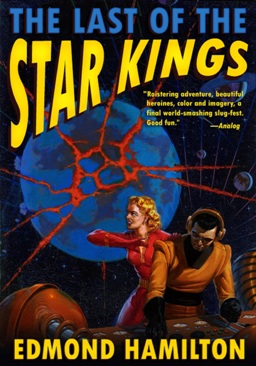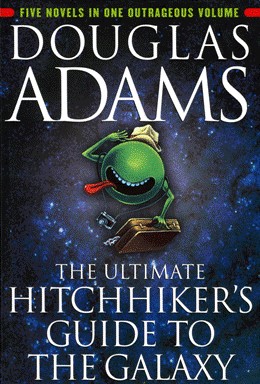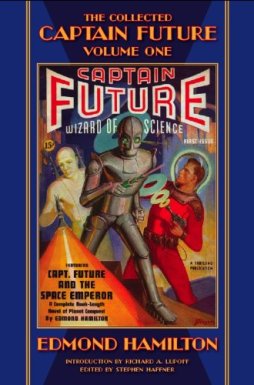Hitchhiker’s Guide to Edmond Hamilton: Who did Douglas Adams Really Read?

Douglas Adams famously wasn’t an SF fan — apparently he “only got to about page 10” of most SF books (source) .
How odd, then, that Hitchhiker’s Guide to the Galaxy reads like a rip-roaring Silver Age Space Opera with added humour and satire.
Douglas Adams always told the same story about the birth of his magnum opus:
One night in 1971 a 19-year-old English hitchhiker named Douglas Adams lay drunk in a field in Innsbruck, Austria. He had with him a borrowed copy of Hitchhiker’s Guide to Europe by Ken Welsh.
No mention of reading widely in the genre.
Really?
Of the influences Adams cited elsewhere, Waugh is literary, Wodehouse is classic British humor. Only Vonnegut is SF, and he’s acceptable-to-the-literati SF; good stuff, but nothing like this…
Far back in the mists of ancient time, in the great and glorious days of the former Galactic Empire, life was wild, rich and largely tax free.
Mighty starships plied their way between exotic suns, seeking adventure and reward among the furthest reaches of Galactic space. In those days, spirits were brave, the stakes were high, men were real men, women were real women and small furry creatures from Alpha Centauri were real small furry creatures from Alpha Centauri. And all dared to brave unknown terrors, to do mighty deeds, to boldly split infinitives that no man had split before — and thus was the Empire forged.
— Douglas Adams, The Hitchhiker’s Guide to the Galaxy

Humorous yes, but behind the irony is something breathtaking. I’ve always craved more of the latter with less of the former — I like my tropes done straight — which is why I recently latched onto the works of Edmond Hamilton.
Imagine my surprise when I read this in The Last of the Star Kings:
…the Empire had steadily grown by exploring and colonizing the wild, unmapped star-systems in the frontier regions called the Marches of Outer Space.
After the war, legend would say, began the Golden Age of galactic man, a mighty empire that spanned the stars, all men united by a single heritage and a single loyalty to the Heartworld from which they came.
And this…
Lute, the Capellan, a small furry individual from arboreal habitat who did incredible things on the high trapeze.
Yes, there’s a “small furry creature”.
Needless to say, Hamilton’s books would have been knocking around in the late 1960s for the teenaged Adams to read.
There are other resonances…
For Adams’s Marvin the Paranoid Android, we have Captain Future‘s intelligent robot called Grag.

For Magrathea’s factory floor for creating planets, we have the Birthplace of Creation in the short story of that name; a place where you can take the controls and spawn planets.
For the Heart of Gold facing missile attack, we have the space mercenaries taking hits in The Closed Worlds.
And, actually, in the same book we have a precursor to the Total Perspective Vortex — the Far Faring which enables you to mentally visit any location in the universe.
There are other possible influences as well. Seeing “all the marvels of the galaxy for less than 5 Altarian Dollars per day”? That’s something E.C. Tubb’s Dumarest would do. Being driven mad by knowing your true place in the universe? That’s a rather Lovecraftian experience, isn’t it?
But the have-space-ship-will-travel-to-exotic-but-hostile-locations-in-the-context-of-a-Galactic-Empire-with-deep-history high adventure and the world-building — galaxy building, really — that reeks of rainy afternoons buried in battered paperbacks with titles like Starwolf.
Having influences and sources doesn’t make the late Douglas Adams any less brilliant. Nor do I think he was being deliberately duplicitous.
Perhaps the alcoholic haze washed away the memories of pages beyond eleven, perhaps Cambridge University undergraduates didn’t admit reading books with talking squids in them — deny something enough and you start to believe the denial.
Or perhaps he binge-read as a teenager and simply forgot. (At about 17 years old, I once read three Michael Moorcock books in a night, and round 3 am had no memory of the contents of the first.)
But Douglas Adams: just ten pages? Really?
(Click to read follow up article.)
M Harold Page (www.mharoldpage.com) has several franchise books on Amazon, plus a creative writing handbook, Storyteller Tools, explaining how he does it. If you live around Edinburgh, Scotland, he’d love to teach you Medieval German Longsword so he can then hit you in the head with one.
I’ve never been able to take Adams’s declarations of only faint familiarity with SF very seriously, nor have I even been able to muster much liking for his work. Why? Because long before I ever read Douglas Adams, I read Robert Sheckley.
I would have to agree. Douglas Adams always seemed to be mocking science fiction. Sheckley used SF to create humorous and funny situations. For Adams, the humour lay in the concepts of SF. The creation of Earth was much funnier in Sheckley’s hands than it ever was in Adams’s. Adams humour was often adolescent and lazy – that “men were real men” quotation is just awful. I remember the reception of the original radio series, when he was taken up by the BBC and became a cult figure. It seemed to me then that he particularly appealed to people whose knowledge of science fiction was limited to what they had seen on the book stands and who thought of the genre only with contempt. Neil
Over the years, I’ve found criticizing Adams to be an extremely touch proposition, as Hitchhiker is one of those books that people tend to bond with when young and deeply love ever after.
Errrm,
If the folks at Monty Python were to tell you they didn’t have a ton of respect for religion, would that make Holy Grail or Life of Brian less funny?
I would agree, criticizing Adams is a long walk off a short branch…
Bring your towels ;-p
I don’t think DA was laughing at us. Often he’s using SF to poke fun at 20th-century culture. “…real men… and… real small furry creatures” is a brilliant attack on Golden Age-ism. And I think his public attitude to SF was “of its time”.
However, it’s nice to find that “we” can take and defend cultural ownership of HHGTG. People, especially the cultural elite, tend to go “oh that’s not SF, it’s___”
Thomas: I suspect you’re right. Those first radio broadcasts were in the late 70s when I had left my adolescence behind. I guess I was too old, as well as being acquainted with Sheckley and the brilliant parodies written by Sladek.
AWA: I recall a discussion between John Cleese and Michael Palin on the one side and Malcolm Muggeridge and someone else on the other, following the release of Lfe of Brian. For those who don’t know, Muggeridge was a journalist and commentator who vigorously defended Christianity. Whilst Muggeridge and his colleague lambasted the Life of Brian, John Cleese equally lambasted both Muggeridge and Christianity in general. At the time, Cleese certainly did not display “a ton of respect for religion”. I watched this discussion with some friends who were radical Christians and can remember that they both enjoyed the debate and the film itself. As did I.
M Harold Page: Probably best to agree to disagree. I don’t think Adams had “a ton of respect” for science fiction and I still think the “men were real men” quotation is puerile. Neil
Follow up here: http://www.blackgate.com/2015/02/03/dont-panic-its-nice-to-know-douglas-adams-read-beyond-page-10
[…] by MHaroldPage [link] [1 […]
[…] of what happened in the previous book. Edmond Hamilton doesn’t just allude to a time “when spirits were brave, the stakes were high, men were real men, women were real women and small f…“. He actually delivers it, on screen, and makes it […]